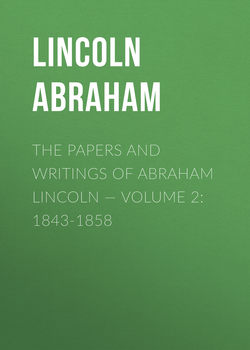Читать книгу The Papers And Writings Of Abraham Lincoln — Volume 2: 1843-1858 - Lincoln Abraham - Страница 15
1846 REMARKS IN THE UNITED STATES HOUSE OF REPRESENTATIVES,
ОглавлениеJANUARY 5, 1848
Mr. Lincoln said he had made an effort, some few days since, to obtain the floor in relation to this measure [resolution to direct Postmaster-General to make arrangements with railroad for carrying the mails — in Committee of the Whole], but had failed. One of the objects he had then had in view was now in a great measure superseded by what had fallen from the gentleman from Virginia who had just taken his seat. He begged to assure his friends on the other side of the House that no assault whatever was meant upon the Postmaster-General, and he was glad that what the gentleman had now said modified to a great extent the impression which might have been created by the language he had used on a previous occasion. He wanted to state to gentlemen who might have entertained such impressions, that the Committee on the Post-office was composed of five Whigs and four Democrats, and their report was understood as sustaining, not impugning, the position taken by the Postmaster-General. That report had met with the approbation of all the Whigs, and of all the Democrats also, with the exception of one, and he wanted to go even further than this. [Intimation was informally given Mr. Lincoln that it was not in order to mention on the floor what had taken place in committee.] He then observed that if he had been out of order in what he had said he took it all back so far as he could. He had no desire, he could assure gentlemen, ever to be out of order — though he never could keep long in order.
Mr. Lincoln went on to observe that he differed in opinion, in the present case, from his honorable friend from Richmond [Mr. Botts]. That gentleman, had begun his remarks by saying that if all prepossessions in this matter could be removed out of the way, but little difficulty would be experienced in coming to an agreement. Now, he could assure that gentleman that he had himself begun the examination of the subject with prepossessions all in his favor. He had long and often heard of him, and, from what he had heard, was prepossessed in his favor. Of the Postmaster-General he had also heard, but had no prepossessions in his favor, though certainly none of an opposite kind. He differed, however, with that gentleman in politics, while in this respect he agreed with the gentleman from Virginia [Mr. Botts], whom he wished to oblige whenever it was in his power. That gentleman had referred to the report made to the House by the Postmaster-General, and had intimated an apprehension that gentlemen would be disposed to rely, on that report alone, and derive their views of the case from that document alone. Now it so happened that a pamphlet had been slipped into his [Mr. Lincoln's] hand before he read the report of the Postmaster-General; so that, even in this, he had begun with prepossessions in favor of the gentleman from Virginia.
As to the report, he had but one remark to make: he had carefully examined it, and he did not understand that there was any dispute as to the facts therein stated the dispute, if he understood it, was confined altogether to the inferences to be drawn from those facts. It was a difference not about facts, but about conclusions. The facts were not disputed. If he was right in this, he supposed the House might assume the facts to be as they were stated, and thence proceed to draw their own conclusions.
The gentleman had said that the Postmaster-General had got into a personal squabble with the railroad company. Of this Mr. Lincoln knew nothing, nor did he need or desire to know anything, because it had nothing whatever to do with a just conclusion from the premises. But the gentleman had gone on to ask whether so great a grievance as the present detention of the Southern mail ought not to be remedied. Mr. Lincoln would assure the gentleman that if there was a proper way of doing it, no man was more anxious than he that it should be done. The report made by the committee had been intended to yield much for the sake of removing that grievance. That the grievance was very great there was no dispute in any quarter. He supposed that the statements made by the gentleman from Virginia to show this were all entirely correct in point of fact. He did suppose that the interruptions of regular intercourse, and all the other inconveniences growing out of it, were all as that gentleman had stated them to be; and certainly, if redress could be rendered, it was proper it should be rendered as soon as possible. The gentleman said that in order to effect this no new legislative action was needed; all that was necessary was that the Postmaster-General should be required to do what the law, as it stood, authorized and required him to do.
We come then, said Mr. Lincoln, to the law. Now the Postmaster-General says he cannot give to this company more than two hundred and thirty-seven dollars and fifty cents per railroad mile of transportation, and twelve and a half per cent. less for transportation by steamboats. He considers himself as restricted by law to this amount; and he says, further, that he would not give more if he could, because in his apprehension it would not be fair and just.
